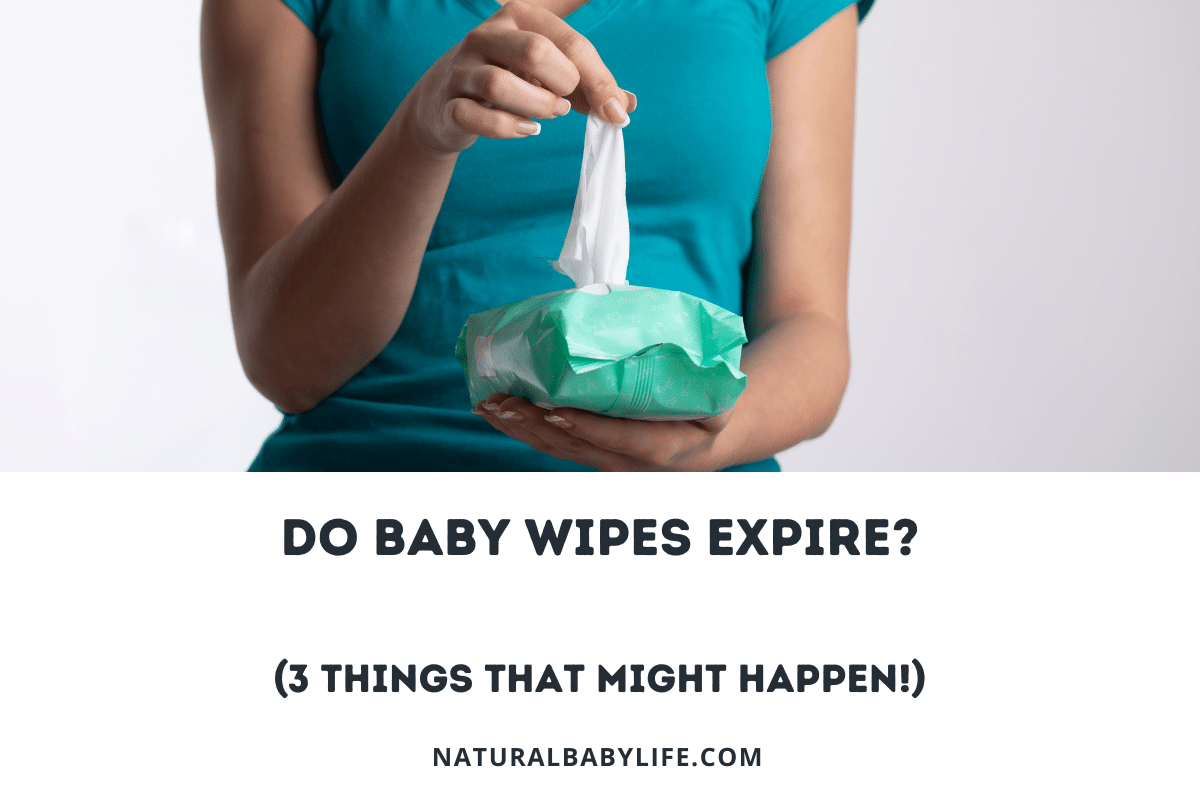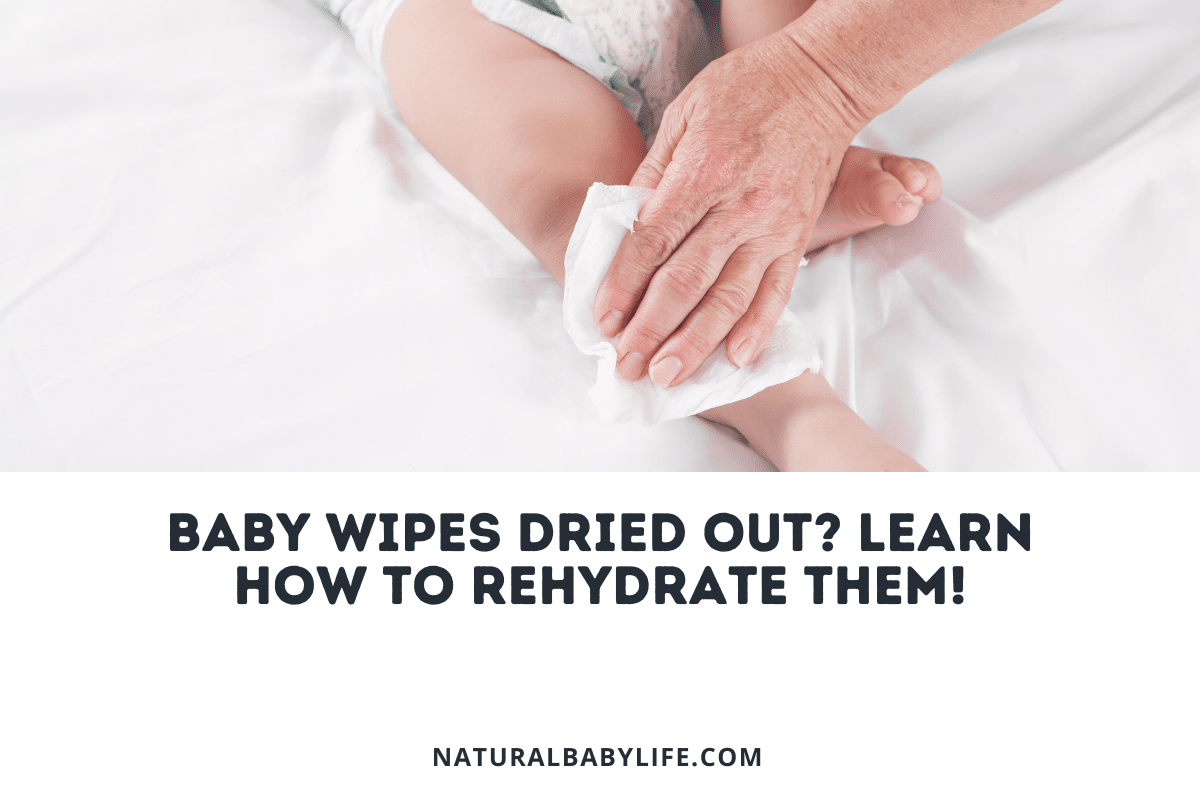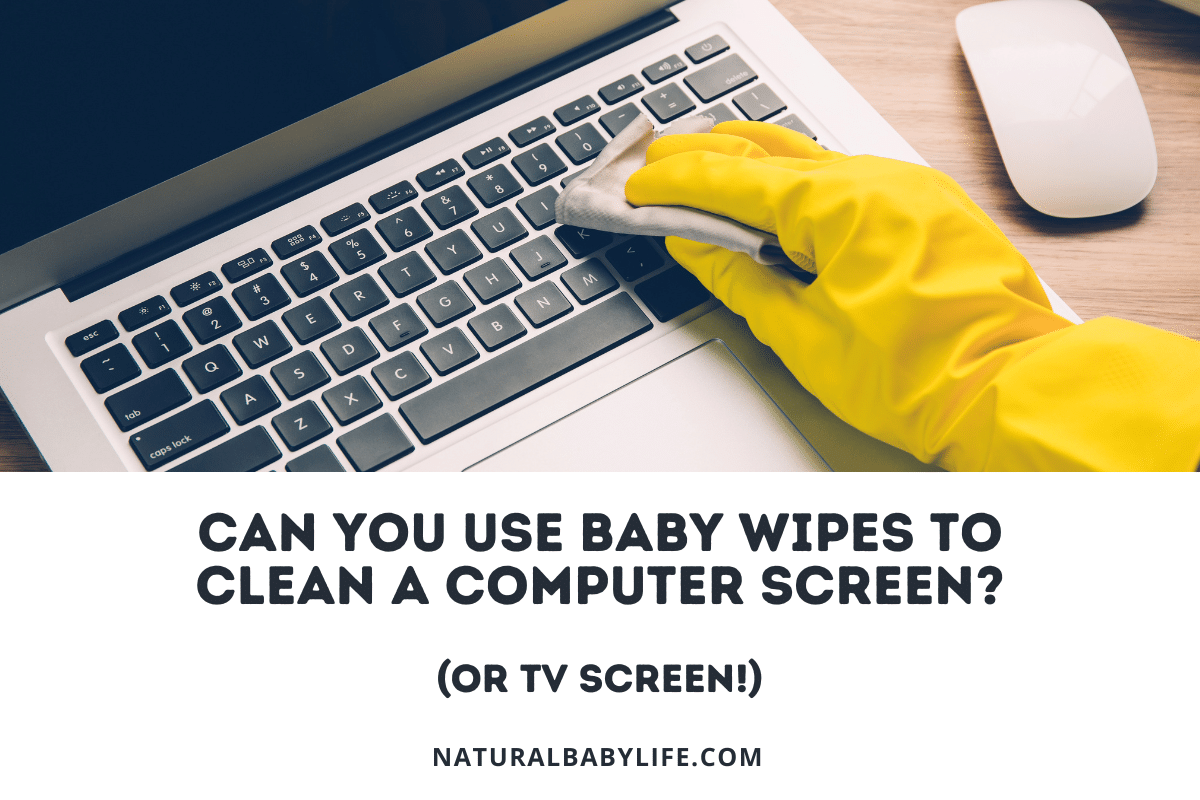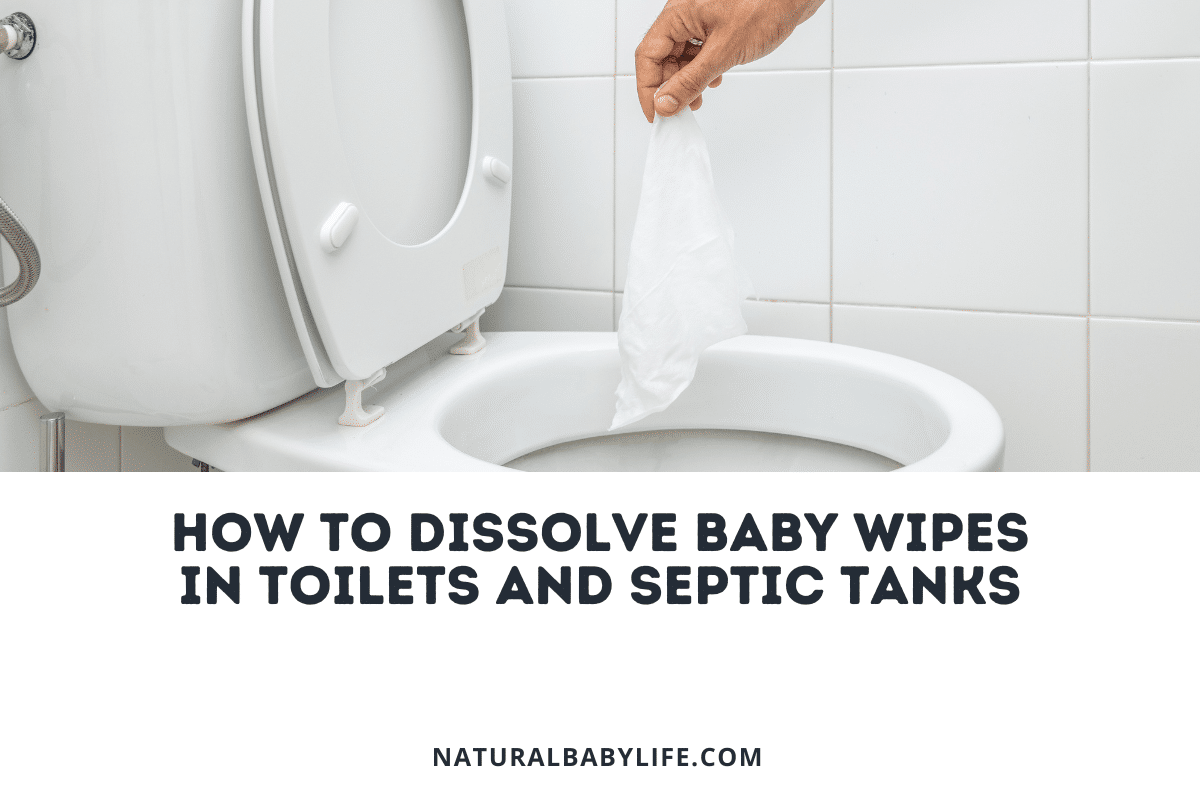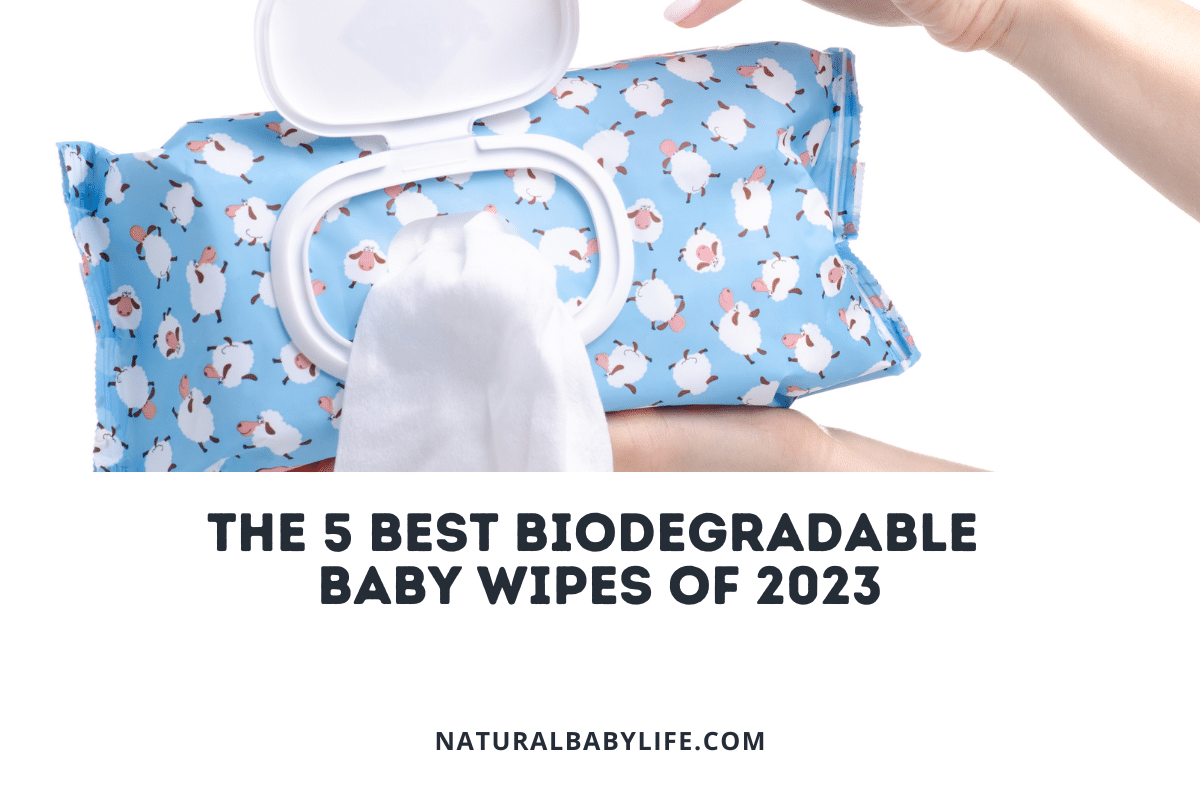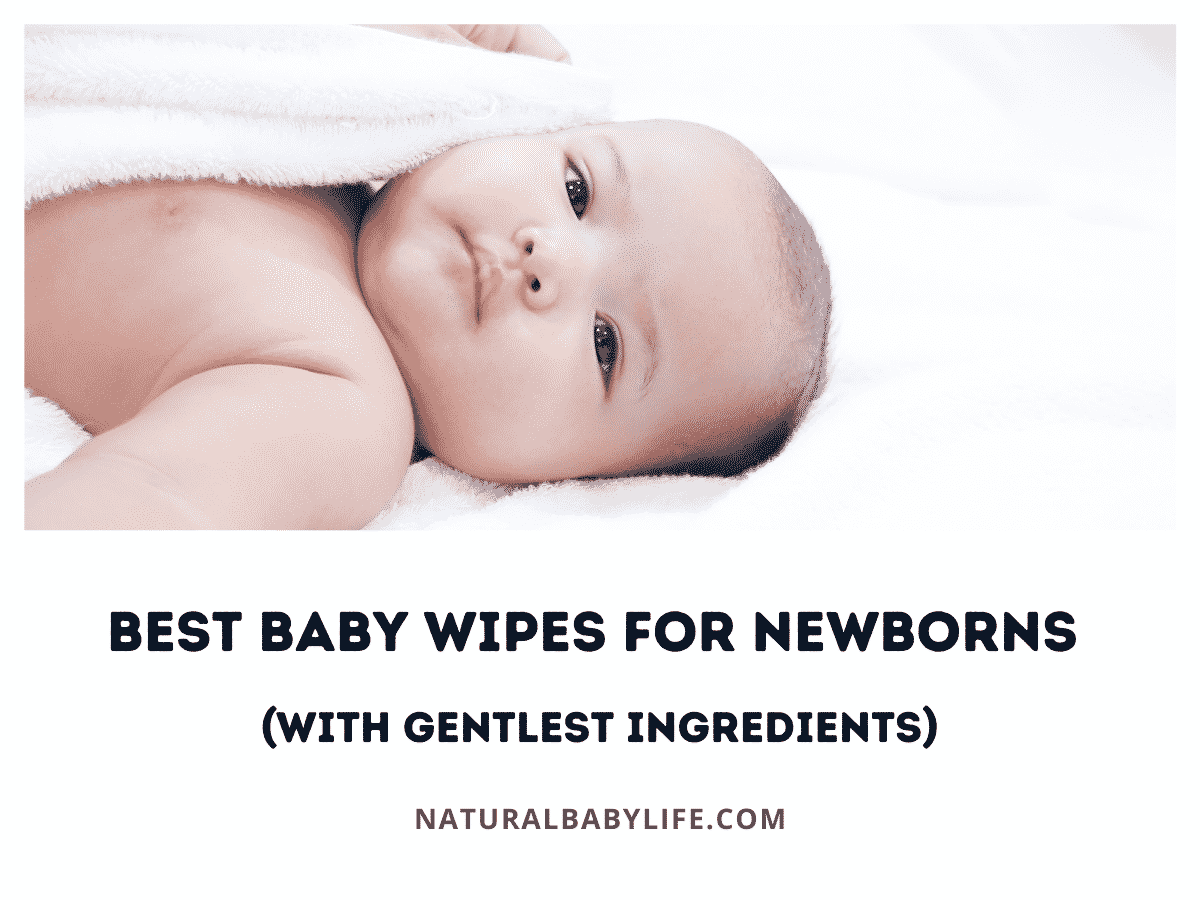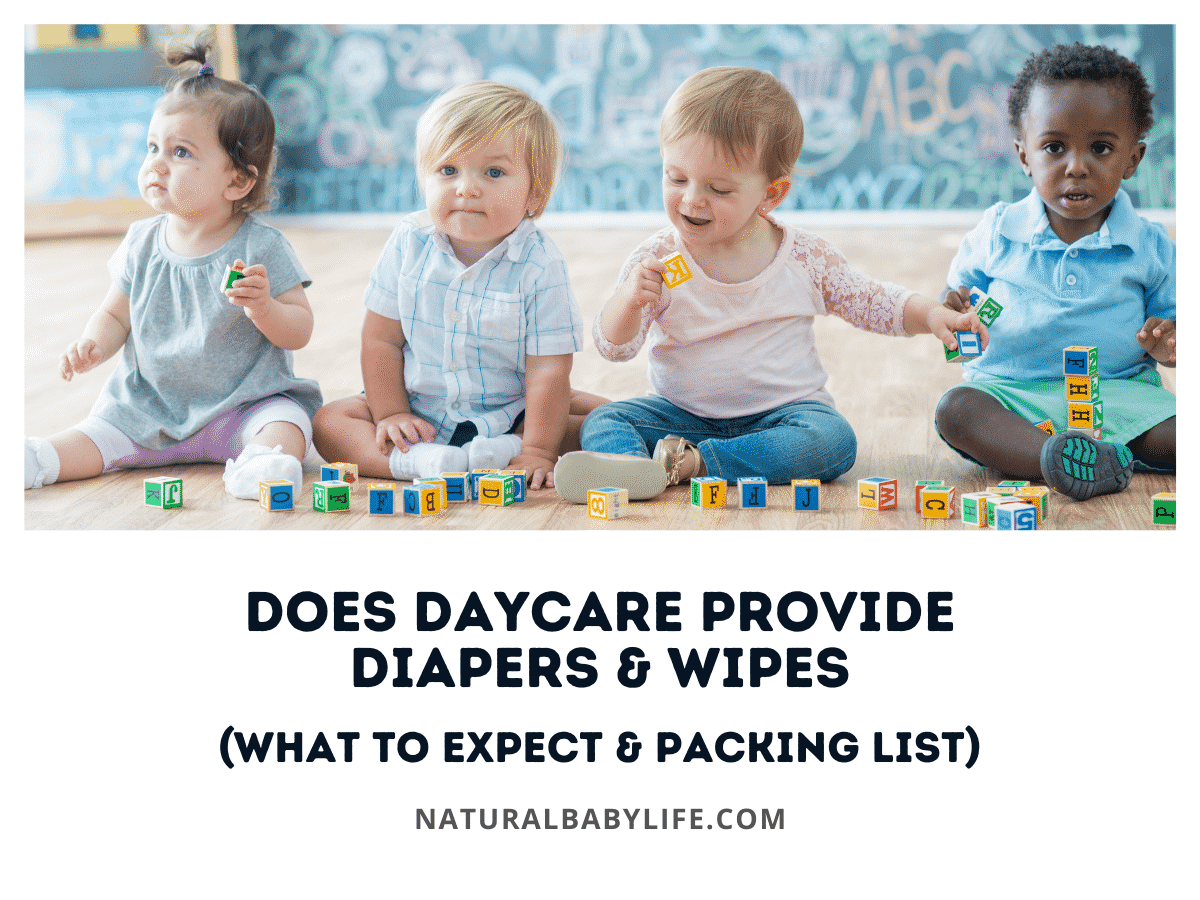Parents can go through hundreds or thousands of baby wipes during the first few years of their baby’s life. If you’re worried that baby wipes will expire or go bad then you might be afraid to stock up on this incredibly necessary item. As a parent, you’ve probably wondered do baby wipes expire?
Most manufacturers recommend using unopened wipes within 2-3 years of purchase and opened wipes within 2-4 weeks after opening. Baby wipes can become less effective if they dry out, mold accumulates, or the wipe solution breaks down. Parents can make baby wipes last longer by storing them in a cool, dry place.
Keep reading to learn more about what makes baby wipes go bad in the first place along with the policy from many popular brands.
Also, If you want to learn how to read expiration or product date codes for Pampers, Huggies, and more – keep reading!
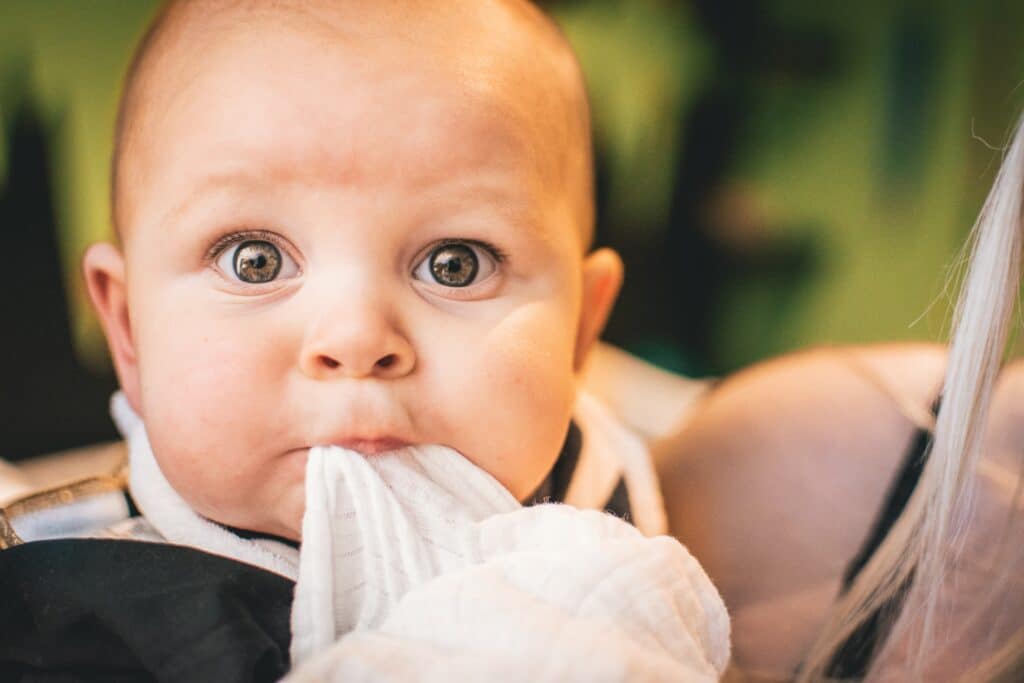
Table of Contents
Do baby wipes expire?
If you’re a parent who has either bought or received boxes of baby wipes, you’ve likely wondered if they expire. Whether you bought them while they were on sale or you received them at a baby shower, you might have unopened boxes or packs of wipes from a year ago or more.
It’s common practice to check the expiration date, best by date, or use by date on food products you buy in the store to make sure they’re safe for you and your family to eat but many parents don’t think to look for an expiration date on baby wipes.
Even though don’t necessarily have an expiration date like food products do, there are some signs that it’s time to get rid of your baby wipes. Let’s first take a look at how long baby wipes should last.
Do baby wipes expire if unopened?
Baby wipes don’t typically have an expiration date listed on the package because there is no requirement for manufacturers to provide one. Unlike food products, baby wipes don’t technically expire.
However, that doesn’t mean you should keep baby wipes forever. Like most products, they will use their effectiveness over time. There are also some signs that your baby wipes are no longer good or should be thrown away.
If you ask baby wipe companies how long their products will last, most will recommend that you use unopened baby wipes within about 2-3 of purchase to ensure maximum effectiveness.
So, you should expect unopened baby wipes to last several years as long as the seal is intact.
How long do natural baby wipes last?
In my house, we always opt for more natural products and that includes baby wipes. In this case, we try to avoid fragrances and chemicals that could irritate our baby’s skin or cause other issues.
It’s more common for natural baby wipe brands, such as Water Wipes, to include an expiration date on their packaging because they don’t include chemical preservatives to prevent mold accumulation in their products. While natural preservatives will still do a great job keeping a product fresh for more than a year, they will go bad relatively faster than baby wipes filled with synthetic preservatives.
In reality, any package of baby wipes should last for many years provided that it has been properly sealed and stored in a cool, dry place.
Where is the expiration date on baby wipes?
If you are looking for the expiration date on baby wipes in the store or ones that you already own, you most likely won’t find one. As I mentioned before, most major brands don’t seem to list dates at all and instead just have a production code for their own internal use.
Among the ones that do offer dates, it’s usually printed underneath the flap on the bottom or on the edge of the packaging – basically somewhere out of the way of their marketing space. While some brands will include the expiration date directly on the package, many use a production code instead. There may be letters at the beginning of the code, but the first numbers will indicate the date of manufacture.
Here are a couple of common ways the production code may be displayed, but most will use the Julian calendar. For this example, let’s use the production code in the image below (AB16321 10130 15:23:26). This – and most production codes – use a Julian calendar, meaning that the date is shown in five digits. The first two numbers indicate the year of manufacture (2016) and the next three are the day of the year (321).
If you’re like me, you don’t know what the 321st day of the year is off the top of your head, so I recommend using this Julian Date Converter, which tells me the package was manufactured on November 16, 2016.
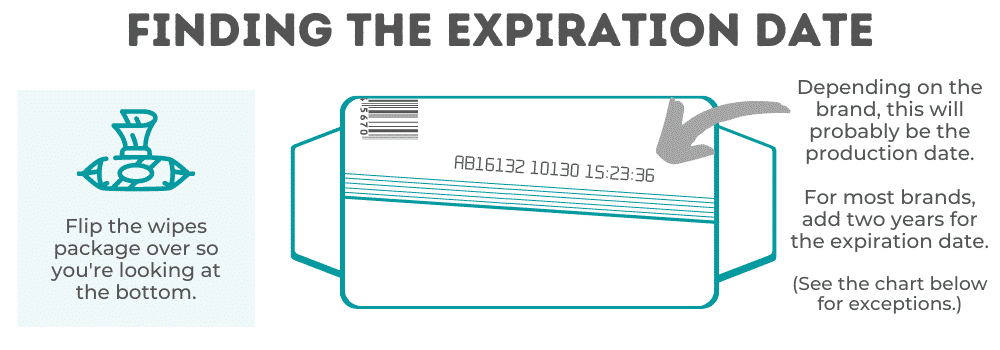
Just in case it saves you a little time, you can check the table below to see whether or not your manufacturer includes a date along with their stated policy (if any) as well as the recommended shelf-life of each brand.
| Brand | How long are wipes good for after manufacture? | Is the expiration date included on the package? |
|---|---|---|
| Huggies Natural Care Wipes | Unopened - 2 years Opened - 1 year | No - date of manufacture only |
| Pampers Aqua Pure Wipes | Unopened - 30 months | No - only a production code |
| Eco by Naty | Unopened - 2 years Opened - 3 weeks | Yes |
| Honest Wipes | unknown | Yes |
| Hello Bello | "they really do not have a shelf life" | Yes |
| Seventh Generation | Unopened - 2 years | No - only a production code |
| Burt's Bee's Chlorine-free baby wipes | Unopened - 3 years | No - only a production code |
| WaterWipes | Unopened - 18 months Opened - 4 weeks | No - only a production code |
| WaterWipes with Soapberry | Unopened - 18 months Opened - 2 weeks | No - only a production code |
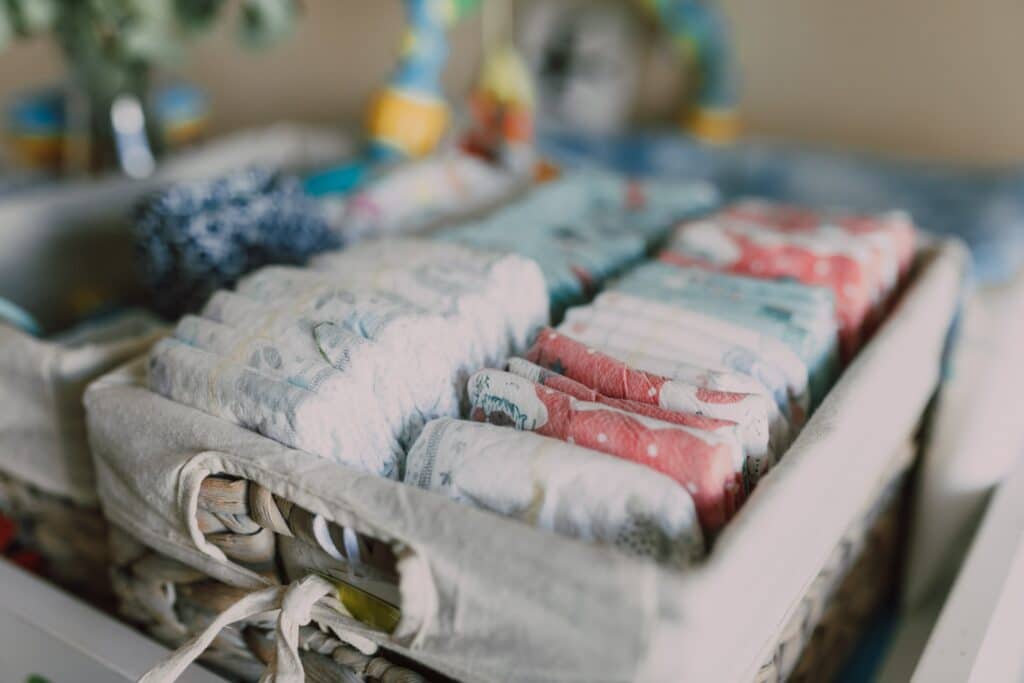
How long do open baby wipes last?
Once the seal on a package of baby wipes has been broken, it’s only a matter of time before the wipes will dry up.
Open baby wipes will generally last several weeks before drying out. Using an airtight baby wipe container after opening can help baby wipes last even longer after opening.
If you aren’t able to use your baby wipes quickly enough after you open them, then you will likely start to notice one of three things happen that we’ll discuss next.
Why do baby wipes go bad or expire?
Like I mentioned before, baby wipes don’t really “expire” but over time they can start to dry out, lose effectiveness, or develop mold. This is completely natural and there isn’t much you can do to eliminate these problems altogether.
So, instead of asking “Do baby wipes expire?” you should probably be asking “Does it really matter?”
To avoid having issues with product complaints and save their butts from any sort of legal entanglement, manufacturers are usually going to have some kind of policy on baby wipe expiration or at least a use-by date.
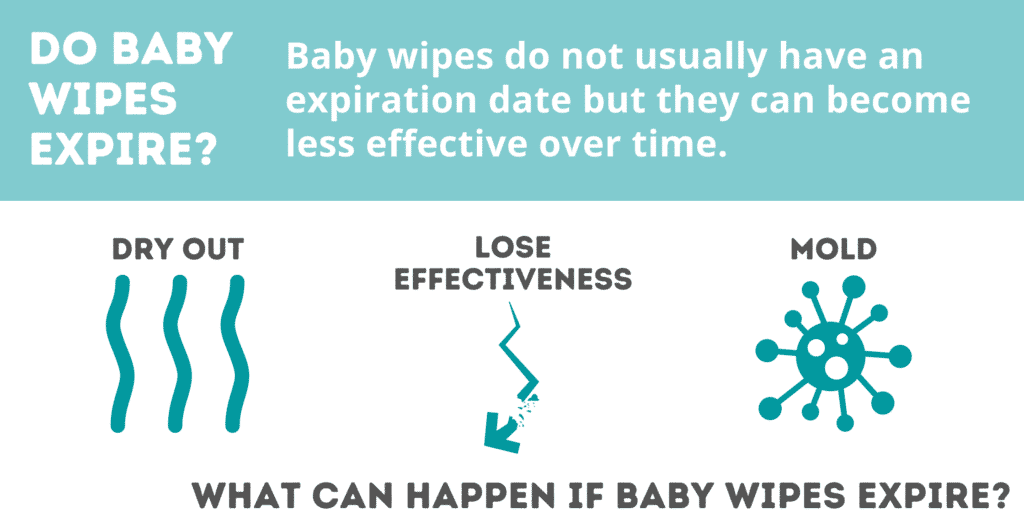
Let’s look at each of these issues and find out why it happens:
Wipes dry out
Even in a ‘sealed’ package of wipes, water can still evaporate and find its way out through tiny gaps and tears over time, drying out the wipes.
If you think this is impossible, try leaving a package of wipes in your trunk for a few months during the summer and see whether or not they are still as moist as the day you bought them. My guess is they will be totally dry! Once the water starts heating up, it expands into water vapor and puts extra pressure on the inside of the package, creating more tiny gaps in the process.
Considering the fact that a lot of baby wipes these days are 99% or more water, this is the biggest potential threat.
Losing effectiveness
Depending on the ingredients included in the baby wipe solution, the formulation can lose its effectiveness over time due to evaporation (chemicals can evaporate too!) or interaction with the air. This issue can be especially true with baby wipes that are meant to condition or moisturize. This is because natural oils can settle out of the solution or accumulate in the bottom portion of the stack of wipes.
Baby wipes losing effectiveness probably ranks lowest on the list because most natural wipes are very mild and contain relatively few ingredients in the first place.
Developing mold
Unfortunately, this is a real issue that does happen, especially in natural wipes that don’t include a lot of chemically antibacterial agents, alcohol, or other sanitizers.
Usually, these wipes are made using highly filtered and sanitized water in the first place, but some bacteria are bound to stick around and, of course, contamination can happen to anything. Over time, these bacteria can gain a foothold and develop as visible mold. If this happens, it’s best to just throw the wipes out.
Remember that even if you take excellent care of your wipe supply by avoiding leaving it in the hot car and the like, your baby wipes have already had quite the journey to get there. They have probably been sitting in a hot warehouse, transported in a hot truck, and then sitting in the retail store for who-knows-how-long before you decided to restock.
So, don’t freak out if you open up a fresh package, even within its use-by date, and it’s not looking so good!

Is it okay to use expired wipes?
The good news for your wallet is that overall, baby wipes that have expired are probably still safe to use. Remember, these dates are really more like a ‘best by’ date in the first place and after the date is passed, it’s really up to you to make a judgment call on whether or not you want to use them.
Expired baby wipes are safe as they are still sealed before you open them, they do not have any mold accumulation, and they haven’t dried out completely.
Just like brand new wipes, the biggest concern with expired baby wipes is that they may have some mold that could irritate your baby’s skin or make them sick. Like I said before, it’s probably best just to discard these wipes and start over with a fresh pack. There’s no sense in taking chances there.
For old wipes that are just dried out, you could still get a lot of use out of them even if they aren’t your go-to for your baby’s bottom. You can still use them to clean up spills or other messes around the house. In fact, a little dryness might be an added benefit here when it comes to absorbing liquid messes!
If you are looking to replace some old wipes, I urge you to check out my diaper wipe resource that includes affordable, high-quality, and biodegradable options that don’t include harsh chemicals that could irritate your baby’s skin. The environment will thank you!
What if my baby wipes smell bad?
If you just opened up a package of baby wipes and they stink or otherwise smell off then you might be worried that something is wrong.
Usually, a smelly baby wipe will have two causes:
- Mold – The first thing you should do is check for mold inside the package. Most people can identify the musty smell of mold fairly easily and a quick visual inspection will confirm that there is something growing inside the wipes and it’s time to throw them away.
- Fragrance-free – If you think your fragrance-free wipes stink, you’re not the first parent to think so. In fact, I’ve tested many fragrance-free wipes over the years and almost all of them smell horrible to me because there is no fragrance to cover up the natural smell of the wipe fabric or other ingredients.
Again, mold is a definite reason to go ahead and throw away your wipes. Using a moldy wipe on your little one could lead to a diaper rash, or worse!
Can I rehydrate baby wipes that have dried out?
If you’re wondering if you can rehydrate dried out baby wipes, the answer is yes, absolutely! Of course, it depends on the situation, but in general, it’s completely fine to rehydrate dried-out baby wipes to help them live another day.
In fact, I actually created an entire resource all about rehydrating dried-out baby wipes if you want a complete guide.
Briefly, the best way to bring old baby wipes back to life is just to mix a few drops of baby shampoo and lotion into water, pour it into the baby wipe package, and shake it up! You could also add a drop of essential oil for fragrance but it’s important to use one that won’t irritate your baby’s skin.
Even though you’re adding a little soap with this method, you’ll still be adding water that hasn’t been filtered or sanitized the same way as the original manufacturer. It’s important to keep in mind you could be introducing some foreign bacteria or contaminants into the mix, depending on the quality of your home tap. It’s likely not a huge deal but it’s best to use up the rest of the wipes within a couple of weeks just to be safe!
One caveat when it comes to rehydrating wipes: At least one major manufacturer recommends against adding water to dried-out wipes because it would dilute their original solution and could make them less effective. Of course, they are also in the business of selling more baby wipes so use your best judgment.
Frequently Asked Questions (FAQs)
Can baby wipes expire before I purchase them in the store?
Yes, they can. Products like baby wipes can sit on store shelves for a long time and aren’t checked as often as food because of their long shelf life. If you find that you’ve purchased an expired product, hang on to your receipt and reach out to the store you bought it from for a refund or replacement.
Will a wipe warmer affect the life of a baby wipe?
Yes, wipe warmers can cause wipes to dry out faster due to the heating element in the unit. It’s recommended to use wipes in a warmer quickly to avoid running into this issue and keep the majority of the wipes in the original container, replacing them as needed.
Do baby diapers expire?
While most baby wipes don’t have an expiration date, they can still dry out or develop mold. It’s important to store your wipes properly to lengthen their shelf life and keep an eye out for anything out of the ordinary.
Conclusion
As a parent, you go through a lot of baby wipes and you may have wondered do baby wipes expire? While there isn’t technically an expiration date on most baby wipes, there are other signs that they’ve gone bad.
Even dried out wipes can often be rehydrated, but if your wipes have mold on them, it’s best to throw them out. Additionally, if you’ve ever wondered if diapers expire, check out this article on the topic!

